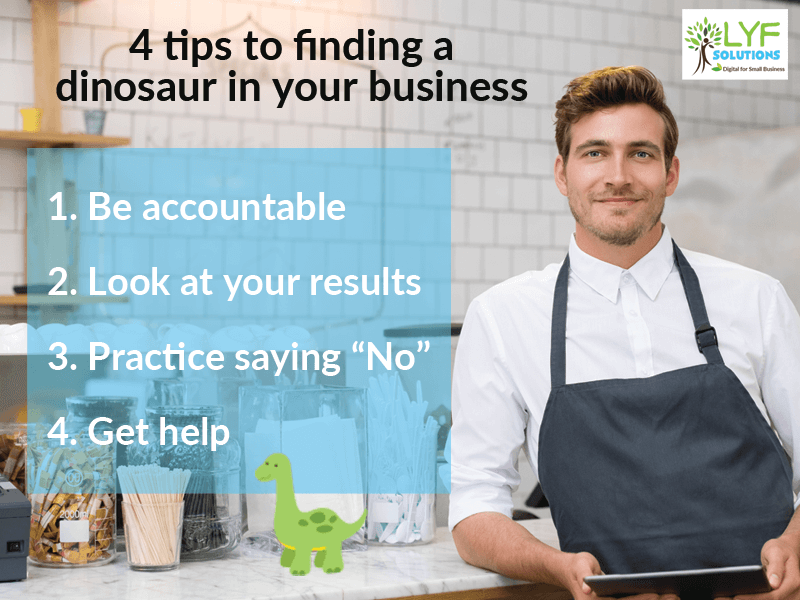By Ray Pastoors, Founder of LYF Solutions
When you run a small business, you can easily get trapped into branching out too quickly. Customers make new demands and trends or competitor moves can impact the way you grow. But what happens when things move too quick? We often forget to look out for every part of our business. Before we know it, a problem may be lurking. This problem could be a dinosaur in your business. An unwelcome guest. Unexpected, hidden, but there.

Since I started my business, LYF Solutions as a hobby back when I was 7 years of age, I’ve learned a few things about running a business. Hopefully, these lessons will help you too.
Lesson 1: Focus
As a business owner, we need to focus our attention on what we want to achieve. If for example, we sell flowers, it’s easy to ‘branch’ out and expand our range to plants or home decor. But we need to ensure we don’t lose focus on our core offering. A recent example of this is Woolworths, who lost customers to competitor Coles, whilst trying to tackle the hardware business. They lost sight of their customer and their needs, and as a result, have worsened their performance.
Lesson 2: We can’t be good at everything
I recall when starting LYF Solutions, I would try to cater for every clients need. Over the years, despite being multi-skilled and wanting to exceed in customer service, I decided I’d look to specialise in only the digital side of marketing. This meant an end to print requests and other items I was not 100% comfortable with. The realisation that it’s ok to outsource or to send people elsewhere, has saved my business time and money in the long run. Think of it this way, Apple might be good at making computers. But when it comes to phones, they could not compete. So they outsourced most of their famous iphone technology to other companies, even the likes of Samsung.
Lesson 3: Throw out the old stuff
Us small business owners are more likely to run with a tiny budget. This means if a product does not sell, we often keep the inventory on hand for some time. It’s always a good idea to review your sales progress. Don’t be afraid to discontinue a range not performing well, as long as you’ve tried several ways to get the product or service moving. Even Sunnyboy ice blocks had an end date.
Lesson 4: It’s OK to say “No”
This tip is important for those who run a service business. Often clients can request things which are at odds with your beliefs, work style or schedule. When your gut tells you, you should say “No” – it’s OK to do so. Sometimes saying “No” can actually result in new opportunities. For example, if you’re already busy and you accept a last minute booking by saying “Yes” you are pushing yourself further and may not meet the client needs, or deliver to the standard you and your current client base expects. If you say “No” you may be able to find a more convenient time and have a happy client after the work is delivered. As well as keeping your current client base happy.
Finding a dinosaur in your business
Running a small business can be difficult. Without you knowing it, problems can arise. They can appear small or large. They may even be hidden. Trying to spot a dinosaur (problem) can be difficult. Here are some tips to help:
1. Be accountable
Set goals every six months or quarterly. If you don’t, you won’t know what you should focus on or what you plan to achieve.
2. Look at your results
Consider what is working and what is not. Ask yourself why a product or service may be doing worse than others. Try new things.
3. Practice saying “No”
For many, even myself, as a positive person – this can be difficult to say. But saying “Yes” to everything doesn’t always help you and can end up being less positive than you first imagine.
4. Get help
Every entrepreneur needs a mentor. Join a local networking group, find a friend who can support you, or seek out feedback from your loyal customers. We can easily become bias over our business. A fresh set of eyes on your business is a good thing.
Running a small business is no easy task. A dinosaur can creep up inside your daily operations without you realising. So be wary of the hidden Dino and focus on what you’re going to do next. Your success depends on it.















